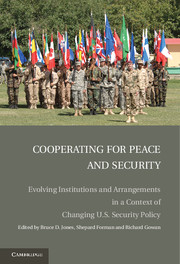 Cooperating for Peace and Security
Cooperating for Peace and Security Published online by Cambridge University Press: 22 January 2010
In 1979, the evolutionary biologists Stephen Jay Gould and Richard Lewontin gave a conference paper that was soon recognized as a classic in their field. At first, it seemed to have nothing to do with evolution at all. “The Spandrels of San Marco and the Panglossian Paradigm: A Critique of the Adaptionist Programme” opens by observing that “the great central dome of St. Mark's Cathedral in Venice presents in its mosaic design a detailed iconography expressing the mainstays of the Christian faith.”
Three circles of figures radiate out from a central image of Christ: angels, disciples and virtues. Each circle is divided into quadrants, even though the dome itself is radially symmetrical in structure. Each quadrant meets one of the four spandrels in the arches below the dome. Spandrels – the tapering triangular spaces formed by the intersection of two rounded arches at right-angles – are necessary architectural by-products of mounting a dome on rounded arches. Each spandrel contains a design fitted into its tapering space. An evangelist sits in the upper part flanked by the heavenly cities. Below, a man representing one of the four Biblical rivers (Tigris, Euphrates, Indus and Nile) pours water into the narrow space below his feet.
This is noteworthy not only because the artistry in the spandrels is beautiful but also because its beauty can fool a tourist or art historian “to view it as the starting point of any analysis, as the cause in some sense of the surrounding architecture.
To save this book to your Kindle, first ensure no-reply@cambridge.org is added to your Approved Personal Document E-mail List under your Personal Document Settings on the Manage Your Content and Devices page of your Amazon account. Then enter the ‘name’ part of your Kindle email address below. Find out more about saving to your Kindle.
Note you can select to save to either the @free.kindle.com or @kindle.com variations. ‘@free.kindle.com’ emails are free but can only be saved to your device when it is connected to wi-fi. ‘@kindle.com’ emails can be delivered even when you are not connected to wi-fi, but note that service fees apply.
Find out more about the Kindle Personal Document Service.
To save content items to your account, please confirm that you agree to abide by our usage policies. If this is the first time you use this feature, you will be asked to authorise Cambridge Core to connect with your account. Find out more about saving content to Dropbox.
To save content items to your account, please confirm that you agree to abide by our usage policies. If this is the first time you use this feature, you will be asked to authorise Cambridge Core to connect with your account. Find out more about saving content to Google Drive.